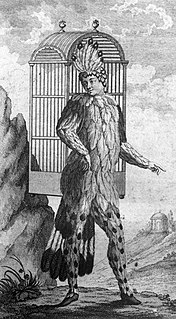Related Research Articles

Emanuel Schikaneder, born Johann Joseph Schickeneder, was a German impresario, dramatist, actor, singer, and composer. He wrote the libretto of Wolfgang Amadeus Mozart's opera The Magic Flute and was the builder of the Theater an der Wien. Peter Branscombe called him "one of the most talented theatre men of his era".

The Mannheim National Theatre is a theatre and opera company in Mannheim, Germany, with a variety of performance spaces. It was founded in 1779 and is one of the oldest theatres in Germany.
Sturm und Drang was a proto-Romantic movement in German literature and music that occurred between the late 1760s and early 1780s. Within the movement, individual subjectivity and, in particular, extremes of emotion were given free expression in reaction to the perceived constraints of rationalism imposed by the Enlightenment and associated aesthetic movements. The period is named for Friedrich Maximilian Klinger's play of the same name, which was first performed by Abel Seyler's famed theatrical company in 1777.
Carolyn Abbate is an American musicologist, described by the Harvard Gazette as "one of the world’s most accomplished and admired music historians". She is currently Paul and Catherine Buttenwieser University Professor at Harvard University. A practitioner of the field’s traditional methodologies, she challenged their limits, mobilizing literary theory and philosophy to provoke new ways of thinking about music and understanding its experience. From her earliest essays she has questioned familiar approaches to well-known works, reaching beyond their printed scores and composer intentions, to explore the particular, physical impact of the medium upon performer and audience alike. Her research focuses primarily on the operatic repertory of the 19th century, offering creative and innovative approaches to understanding these works critically and historically. Some of her more recent work has addressed topics such as film studies and performance studies more generally.
Wye Jamison "Wendy" Allanbrook was an American musicologist whose writings demonstrated that much of the music of Mozart and his contemporaries was influenced by the social dances of the time.

Oberon is an epic poem by the German writer Christoph Martin Wieland. It was based on the epic romance Huon de Bordeaux, a French medieval tale, and influenced by Shakespeare's A Midsummer Night's Dream and Alexander Pope's version of Geoffrey Chaucer's The Merchant's Tale. It first appeared in 1780 and went through seven rewrites before its final form was published in 1796.

Abel Seyler was a Swiss-born theatre director and former merchant banker, who was regarded as one of the great theatre principals of 18th century Europe. He was "the leading patron of German theatre" in his lifetime, and is credited with introducing Shakespeare to a German language audience, and with promoting the concept of a national theatre in the tradition of Ludvig Holberg, the Sturm und Drang playwrights, and German opera. Already in his lifetime, he was described as "one of German art's most meritorious men."

The Seyler Theatre Company, also known as the Seyler Company, was a theatrical company founded in 1769 by Abel Seyler, a Hamburg businessman originally from Switzerland who became "the leading patron of German theatre" in his lifetime. It was largely a continuation of the Hamburgische Entreprise, whose dramaturge was Gotthold Ephraim Lessing and whose main owner was Seyler. The Seyler theatrical company became one of the most famous theatrical companies of Europe in the 18th century, attracting some of Germany's leading actors, playwrights and composers. It originally comprised around 60 members, including an orchestra, a ballet, house dramatists and set designers. Between 1777 and 1778 Seyler employed some 230 actors, singers and musicians. The company was originally contracted by the Hanoverian court with performing at Hanover and other cities of the kingdom. The company would eventually perform all across Germany, and performed for three years at the Weimar Schlosstheater, invited by Duchess Anna Amalia of Brunswick-Wolfenbüttel. When Anna Amalia succeeded in engaging the Seyler Company, this was "an extremely fortunate coup. The Seyler Company was the best theatre company in Germany at that time." The company had an important role in the development of German opera in the late 18th century.

Oberon, or The Elf King, or simply Oberon, originally known as Huon and Amanda, is a romantic Singspiel in five acts by Friederike Sophie Seyler, based on the poem Oberon by Christoph Martin Wieland, which itself was based on the epic romance Huon of Bordeaux, a French medieval tale. It has been named for two of its central characters, the knight Huon and the fairy king Oberon, respectively.
John A. Rice is an American musicologist. Born in 1956, he studied music history at the University of California, Berkeley. He has taught music history at the University of Washington, Colby College, the University of Houston, the University of Texas at Austin, the University of Pittsburgh and the University of Michigan. He has received grants from the Alexander von Humboldt Foundation, the National Endowment for the Humanities, and the American Philosophical Society.
David Joseph Buch is an American musicologist.
Daniel Evan Freeman is an American musicologist who specializes in European art music of the eighteenth century, in particular the musical culture of eighteenth-century Prague and the Bohemian lands. He is also active as a pianist and music editor.

Established on June 18, 1905, Chicago’s Pekin Theatre was the first black owned musical and vaudeville stock theatre in the United States. Between 1905 and 1911, the Pekin Club and its Pekin Theatre served as a training ground and showcase for Black theatrical talent, vaudeville acts, and musical comedies. Additionally, the theatre allowed “African-American theatre artists with an opportunity to master theater craft and contribute significantly to the development of an emerging Black theater tradition”.

Mark Everist is a British music historian, critic and musicologist.

The Magic Flute is a celebrated opera composed in 1791 by Wolfgang Amadeus Mozart. Mozart employed a libretto written by his close colleague Emanuel Schikaneder, the director of the Theater auf der Wieden at which the opera premiered in the same year.. Grout and Williams describe the libretto thus:
Schikaneder, a kind of literary magpie, filched characters, scenes, incidents, and situations from others' plays and novels and with Mozart's assistance organized them into a libretto that ranges all the way from buffoonery to high solemnity, from childish faerie to sublime human aspiration – in short from the circus to the temple, but never neglecting an opportunity for effective theater along the way.
Kathleen Kuzmick Hansell, née Kuzmick, is an American musicologist and organist. Amongst her publications are pioneering research on the role of dance in 18th century opera and critical editions of opera scores by Mozart, Rossini, and Verdi.
Rosamunde is a singspiel by Anton Schweitzer to a German-language libretto by Christoph Martin Wieland for the Seyler theatrical company of Abel Seyler, premiered 20 January 1780, at the Nationaltheater Mannheim. The singspiel was revived by the 60th Schwetzingen Festival in 2012 in a production by Jens Daniel Herzog.
Julian Gordon Rushton is an English musicologist. He has contributed the entry on Mozart in The New Grove Dictionary of Opera and several other articles in The New Grove Dictionary of Music and Musicians and other reference works. He has written a critical study of the style of Hector Berlioz and was involved in critical editions of that composer's works. In 1999, he published an analysis of Elgar's Enigma Variations. His book Coffee with Mozart (2007) has been translated into German.
The Railroad Porter, also released as The Pullman Porter, is a film produced by The Foster Photoplay Company that was released in 1912 or 1913. It was the film company's first release and one of the earliest American films produced by African Americans.
Lottie Grady was a singer, dancer, and comedian who performed in theatrical productions and vaudeville as well as films. She performed at the Pekin Theatre in Chicago where she was a star member of its stock company.
References
- ↑ "Thomas Bauman". Northwestern University.
- ↑ Review of The Pekin: The Rise and Fall of Chicago’s First Black-Owner Theater, Choice: Current Reviews for Academic Libraries